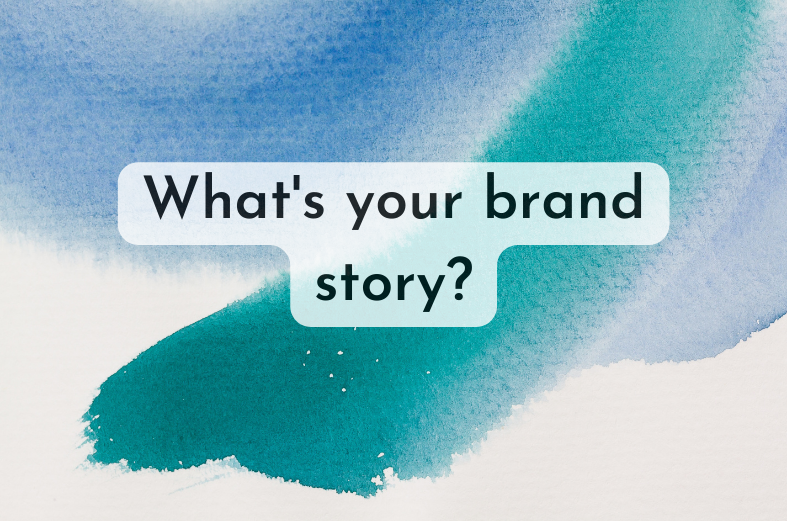
One of the most important assets your business will ever have is your brand story. Get your storytelling right, and it’s something that’s completely unique to your business that nobody can take away. No matter what social media platforms do to their algorithms, or what trends in marketing come and go, your brand story will always be yours.
What even is a brand story?
A brand story is your business’ overarching narrative that conveys your values, your reason for being, and what they get from their association with you. Storytelling is humanity’s oldest method of communication, passing down a society or culture’s connections, morals, and values. Think Maori whakapapa and creation myths about the natural world’s relationship to its various parts and to us. Or Aesop’s Fables. Or the stories in the Bible or Koran.
And so your brand story is what makes you memorable, what brings out your individual youness and makes people jazzed to work with you, because you get it. You get them.
But my brand story’s not very interesting.
That’s what you think! It doesn’t have to be a start-to-finish history, like, say, the newly-minted Princess of Wales (grew up middle class! Met the future King at university! Make no mistake, this is part of her branding).
Your brand story is what gives you, and your work, a soul. It’s what takes Allbirds from shoes made of wool to what you buy when you care about sustainability. Or how Apple appealed to people who wanted to ‘think different’ and be creative. In short, your brand story is about what you care about, and its human connection. People buy from people; they don’t buy from robots.
So where’s your soul? What’s the connecting thread to humanity? A cleaning business might maintain a fresh, healthy environment for people to do their best work in. Or a photographer might capture fleeting moments that nobody notices till after they’re gone.
My brand story
I never thought I’d have a business. I was always good at writing and communicating, and that was…about it. Business was not something on my radar.
I went overseas at the end of 2008, and discovered what a recession was. No jobs. So my then-partner (now husband) got me some copywriting work for one of his website clients. And when we got back to New Zealand, still no jobs, so I…kept doing it.
What did I do? Looked to Google to tell me how to do it. I hated cold calling and cold emailing, but I did it anyway. I Tweeted. I wore uncomfortable shirts to meetings. I did some borderline unethical things to gauge what other people were charging because I had no idea. I handed out business cards at in-person networking events like lollies.
Slowly I built it to a handful of pretty awesome regular clients. And I grew to really enjoy the freedom of being able to say no to work I didn’t want, and to knock off whenever I wanted, and to not join the rush hours.
But in the back of my mind, there was this nagging feeling that something wasn’t right. I tried employment a few times, but didn’t like the fixed schedule and politics.
Maybe I was just a bit useless at everything, I thought.
And then I realised. All this time I’d been doing what other people (i.e. Google’s search results) told me to, even if it made me feel yuck, because I thought that was what you ought to do.
Now I know better. Your business is yours – and you shouldn’t be doing things in it that make you feel yuck. It should feel like you, it should be a place you’re happy in, and where you can live your core business values. Because your clients can tell if you’re not.
Then it was 2020 and the copywriting vanished overnight – marketing is one of the first things to go when businesses tighten their belts. Somewhere I read an article about coaching, and a lightbulb went off. This is what I could do. But this time, I would work with creative people.
Because now I knew what it was like to build a business around what other people say you should do, and how uncomfortable it is trying to squeeze yourself into a space that doesn’t really fit.
My whole coaching brand is around building a business that feels right for you. You don’t have to do anything that feels a bit dodgy or you just really don’t like, you can build it around the life you want, and you can work as and when is best for you. I want all people with a creative business to have the space to explore and grow their creativity, to love their work, and to make as much doing it as they want.
Does any of this resonate for you?
The part of the narrative I want you to notice is that I’m a creative who fell into business and struggled to find herself. I looked to others to tell me what to do, rather than being true to myself, and battled through massive impostor syndrome.
When I was forced to give myself permission to admit what wasn’t working, and to consider what would work, the world got brighter. I work the days and times I want. I can work with the people I want to work with. I can be myself, and not worry about whether I’m coming across ‘right’.
You can do that too. Find your narrative, the one that gets attention and a fist bump from the people you know you can help. Then show them how your narrative can connect to and fit with theirs.
Show them how you can be a part of their story.